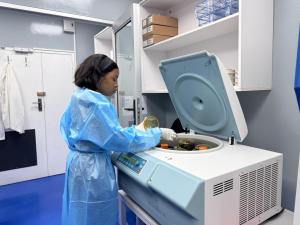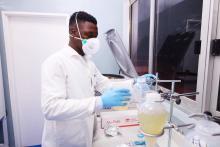Zimbabwe strengthens polio surveillance with new environmental laboratory
Harare - Zimbabwe has bolstered its ability to detect and respond to poliovirus ooutbreaks with the commissioning a state-of-the-art Environmental Surveillance (ES) laboratory unit within the National Polio Laboratory. This significant milestone, which was marked by an official commissioning ceremony, enables the country to test wastewater for poliovirus, allowing for early detection of the virus and allowing timely response to potential outbreaks.
The ES unit was made possible with support from the World Health Organization (WHO) and by a grant from the Gates Foundation, along with the dedicated support from Rotarians on the ground.
"With the capacity for environmental surveillance now in place, we are not just tackling polio; we are enhancing our broader environmental health surveillance capabilities," said Dr. Raiva Simbi, Director of Laboratory Services in the Ministry of Health and Child Care (MoHCC), during the commissioning ceremony. "This laboratory will allow us to not only test for polio but also to explore genomic sequencing and extend our diagnostic abilities to address other emerging infectious diseases."
Environmental surveillance is a proven tool in polio eradication efforts, helping countries quickly identify and contain potential outbreaks. The new ES laboratory comes equipped with specialized technology and laboratory equipment, along with specially trained personnel, to monitor and test wastewater for poliovirus. This system allows Zimbabwe to detect signs of poliovirus circulation even before clinical cases are reported, a proactive measure that can significantly improve outbreak response and public health interventions.
In March 2023, Zimbabwe launched its Environmental Surveillance for Polioviruses programme to complement ongoing Polio surveillance through the case based Acute Flaccid Paralysis (AFP) system thereby increasing overall sensitivity of the country’s Polio surveillance to detect poliovirus transmission timely. Initially starting with 4 sites in Harare Province, the programme has since expanded to 9 sites nationwide. This led to the detection of variant poliovirus type 2 (cVDPV2) in wastewater, with 32 isolates found between August 2023 and December 2024. Additionally, in December 2023 a 10-year-old girl was diagnosed with acute flaccid paralysis (AFP) caused by cVDPV2, marking the first human case in the country during that period. These findings underscore the necessity of ongoing surveillance and prompt intervention to address public health emergencies.
Previously, Zimbabwe relied on regional laboratories to test environmental samples, which had persistent delays of more than 21 days in receiving results. Operation of the new ES laboratory will greatly reduce the results turnaround time and improve timely detection and response to any poliovirus outbreaks.
The laboratory achieved full accreditation in 2022 for virus isolation and intratypic differentiation techniques, essential for identifying different polio types and it is part of the 16 accredited poliovirus laboratories in the WHO African Region in 2024. Building on this, the establishment of the ES unit was recommended to track the virus in water and sewage. By March 2025, after significant refurbishment and parallel testing, the laboratory is now fully operational, with WHO implementing a quality control system to ensure timely and accurate results.
"The establishment of this new laboratory unit not only improves the country’s ability to detect poliovirus at an earlier stage but also enhances its broader public health capabilities. This investment demonstrates the importance of proactive surveillance in safeguarding the health of future generations across the region," notes Dr. Desta Tiruneh, WHO Representative to Zimbabwe.
Communications Officer
Polio Eradication Programme
WHO Regional Office for Africa
Email: mongem [at] who.int (mongem[at]who[dot]int)
Tel: + 34 636 04 76 79
Vivian Mugarisi
External Relations Officer
Email: mugarisiv [at] who.int (mugarisiv[at]who[dot]int)


